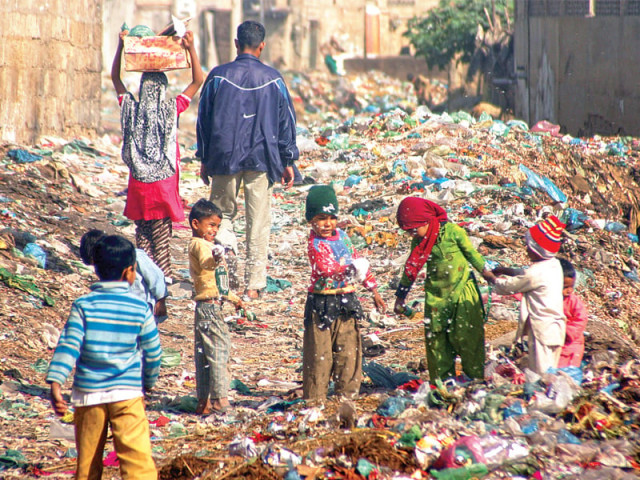Solid waste management: Need for a cohesive approach to make up for failed attempts
Two separate projects, launched in the 1990s, were abandoned because of poor planning.

In the informal recycling sector, there are serious issues with the use of minor children [ragpickers] in highly hazardous conditions, subject to serious health problems. PHOTO COURTESY SHEHRI-CBE
Karachi never had a very efficient and functional solid waste management system but things are now getting from bad to worse - the visible manifestation of the crisis at hand are the heaps of solid waste dumped along the streets, nullahs, open spaces and often being openly burnt.
If we look at historic context, the Karachi Metropolitan Corporation (KMC) earlier had jurisdiction over the collection, transfer and disposal of solid waste from the city that was administered by the respective District Municipal Corporations (DMCs). Problems existed at all stages in the process chain; improperly designed and located neighbourhood collection points, a truck-based transportation system covering long distances that increased cost and added to the wear and tear only to dump and burn the waste in non-engineered ‘landfill sites’ [Jam Chakro, Surjani Town and Gond Pass, Hub]. According to official estimates, at best half the waste generated actually got to the ‘landfill sites’ while the rest got dumped and burnt within the city.
Failed attempts
Despite inherent shortcomings, there were efforts at experimenting with alternative models of solid waste management. In 1994, the KMC initiated the ‘Garbage Train Project’, which proposed that the inner city circular railway system (KCR) be integrated with the existing trucking service, for the transfer of solid waste to a site 50 kilometres from the city [5,000 acres of land were acquired for the purpose in the Dhabeji area on the National Highway).

The ultimate disposal mechanism was to be sanitary land filling. Prior to final transfer, the garbage was to undergo sorting, bailing and compacting at garbage transfer stations with a proposed garbage city to be developed at the site with participation of the informal sector. The project, planned as a joint venture by KMC and Pakistan Railways, was abandoned just a few months into the operation phase. The main reasons for this failure included insufficient lead research and improper upgradation of supporting infrastructure - but above all, a complete lack of effective collaboration between KMC and the railways. A project that promised much delivered nothing due to internal politics and inefficient management.
Then in 1998, a pilot project of ‘privatisation’ of solid waste management was initiated when the DMC Central signed a contract with a private agency for household collection and transfer of waste from parts of FB Area and North Karachi. The private contractor introduced new household collection modes, such as tricycles [specially designed on a Chinese model], Suzuki vans and dumper/loaders. The project was abandoned. Reasons of failure attributed to lack of prior planning, solid waste that the contractor had to collect in the end being much more than the provided figures DMC, lack of any element of recycling and resource recovery that could have made the project more financially viable and ultimately, failure to involve the targeted.
With the introduction of the revised local government system in 2001, the Towns were made responsible for collection and transfer to the ultimate disposal site while KMC was mandated to administer the landfill sites. This change, however, gave rise to further collaboration problems.
Looking ahead
In a city that still generates more than 50 per cent organic waste, we have no programme, either at the government or private level, that could look into the issue of generating compost [decayed organic material used as a fertiliser] and link it with a programme of increasing green spaces in the city.
This is an aspect that can work right from the household to a city-wide level. ‘Reuse, recycle’ is also not organised at any professional level that has a high financial and waste reduction component attached to it. In the informal recycling sector, there are serious issues with the use of minor children [ragpickers] in highly hazardous conditions, subject to serious health problems.
Solid waste management works as a ‘chain process’, right from the generation of waste to its ultimate disposal, which needs to be effectively ‘linked’ and coordinated at all levels for viable improvements. There is an urgent need to generate much needed primary data, create an enabling space for the ‘private sector’ to make a positive contribution, raise awareness and involvement of the public, investment in local technology development and human resource to reduce costs in implementation and management.
The writer is an urban planner and runs a non-profit organisation based in Karachi city focusing on urban sustainability issues. He can be reached at fanwar@sustainableinitiatives.
Published in The Express Tribune, November 11th,2013.


















COMMENTS
Comments are moderated and generally will be posted if they are on-topic and not abusive.
For more information, please see our Comments FAQ